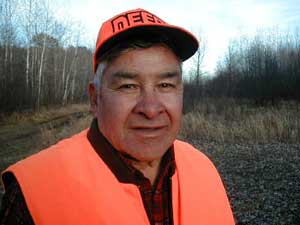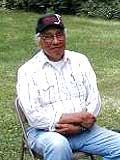More than recreation
November 22, 2002
 |
| Mille Lacs Band member Leonard Sam on a recent deer hunting trip. (MPR Photo/Tim Post) |
Mille Lacs, Minn. — It's not easy to get to Leonard Sam's favorite hunting spot. To get there, Sam takes a dirt road surrounded by dense forest on the Mille Lacs reservation. The bottom of his four-wheel-drive scrapes the ground as the path narrows. This 3,000-acre piece of the reservation is set aside for hunting -- and it's prime deer country. But it's only for Mille Lacs Band members.
"I know people want to get into it," Sam says. "It's hard to say no to a lot of people. But that's what it comes down to -- we have to say no to them."
It takes Sam 20 minutes to drive two and a half miles, and the trip's not over. He hops on an ATV to travel deeper into the woods. Leonard Sam is dressed in a blaze orange hat and hunting jacket for safety. Before the hunt, he throws tobacco on the ground. He's asking the Great Spirit to keep him safe as he heads out to hunt. Along with his modern hunting equipment, Sam also takes with him knowledge passed down from years of hunting culture. Sam's father taught him to hunt.
 | |||
"And he'd always tell me in Ojibwe, 'The ground will tell you where to go. You don't find anything on your own, it'll tell you where to go.' And that's true .. I've seen it so many times," Sam says.
Sam walks into the woods with his rifle on his back, looking for that perfect spot. The ground tells him where it is -- he sees a faint trail about 25 yards ahead.
"They usually come from this side. There's open fields over on the right, on the east side of us. Hopefully they'll come through this way," Sam says.
Sam sets up a small deer stand on a tree, sits on it, and waits in silence. He's watching the woods for any movement, and he's listening. After 30 minutes of waiting, he hears a twig snap to his right. Sam stands up, raises his rifle, and fires. Fifty yards away, a doe falls to the ground.
 | |||
Lenard Sam guts his deer in a matter of minutes. His more than 50 years of hunting have sharpened his skills. This is his 10th deer this season.
Under an 1837 treaty, Sam can take as many deer as he wants in certain areas of Minnesota and Wisconsin. And although he says the hunt is fun, there's more to it than that. "I don't go out here to shoot deer and let them lay," Sam says. "I go out to hunt deer and take them back to home, so that somebody else can enjoy it. That's what the elders have alway told us, 'You got it, use it, but don't abuse it.'"
A game warden will come to Sam's house and pick up the deer tomorrow. The warden will have it tested for chronic wasting disease. Then the deer will be processed, and the meat will be given to elders on the Mille Lacs reservation.
For people who rely on deer for food, it's hard not to get nervous about CWD. No cases of CWD have popped up in Minnesota's wild deer population. But scientists are not sure how the disease is spread, or if it's possible for deer to pass a form of the disease to humans.
 | |||
Sam says he understands the concern. But he says until they know for sure, hunters should keep hunting, and tribal members shouldn't worry about eating deer.
"A lot of the hunters didn't start hunting right away, just because of the possibility of CWD. I can see that, but I feel that until we do have a case of it around here, then I'll be more afraid. But right now I'm not even concerned about it," Sam says.
Sam uses his ATV to get his deer out of the woods. The talk of CWD doesn't put a damper on the day's hunt.
"Today was a very good day. The weather was good, the Great Spirit was over us. That's why I threw tobacco out for that, just told him to give us a good day. I didn't ask for anything, I just told him to give us a good day and to keep us safe, everything fell into place itself, so that was good," Sam says.
Mille Lacs Band Member Leonard Sam will hunt again soon. He thinks he'll get a few more deer this season.
|
News Headlines
|
Related Subjects
|

